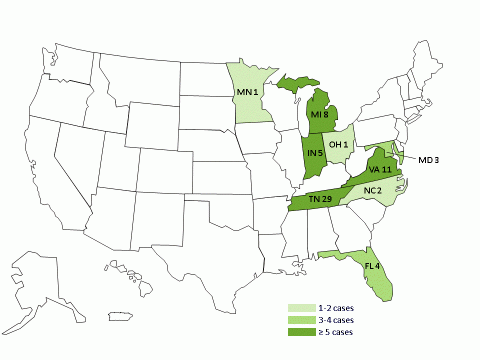 Atlanta, GA – Centers for Disease Control and Prevention (CDC) is coordinating a multistate investigation of meningitis among patients who received epidural steroid injections (medication injected into the spine).
Atlanta, GA – Centers for Disease Control and Prevention (CDC) is coordinating a multistate investigation of meningitis among patients who received epidural steroid injections (medication injected into the spine).
Several of these patients have had strokes related to the meningitis. In several patients, the meningitis was found to be caused by a fungus that is common in the environment but rarely causes meningitis. This form of meningitis is not contagious.

Centers for Disease Control and Prevention, 1600 Clifton Road, Atlanta, GA 30333, USA
800.CDC.INFO (800.232.4636) TTY: 888.232.6348
FDA Statement on Fungal Meningitis Outbreak
U.S. Food and Drug Administration (FDA) is working closely with the CDC and state partners to investigate an outbreak of meningitis among patients who had received an epidural steroid injection. Investigation into the exact source of the outbreak is still ongoing, but the outbreak is associated with a potentially contaminated medication.
That product is preservative-free methylprednisolone acetate (80mg/ml), an injectable steroid produced and distributed by New England Compounding Center (NECC) in Framingham, Massachusetts. CDC’s interim data show that all infected patients received injection with this product. As of October 3rd, 2012, NECC has voluntarily shut down.
FDA has observed fungal contamination by direct microscopic examination of foreign matter taken from a sealed vial of methylprednisolone acetate collected from NECC. FDA is in the process of conducting additional microbial testing to confirm the exact species of the fungus. As part of the ongoing investigation, FDA will continue to work closely with CDC and state authorities to determine whether this sample taken from the product matches the organism found in patients. We are working diligently to expedite that process.
Users should also notify FDA of any complaints or problems associated with these products. These reports may be made to MedWatch, the FDA’s voluntary reporting program, by phone at 1.800.FDA.1088 or on line at www.fda.gov/medwatch/report.htm .
At A Glance
- Status: Ongoing Investigation
- Infection: Fungal Meningitis
- Facility Type: Outpatient Setting
- Case Count: 64
- States: 7
- Deaths: 7
Patient Information
Is the source of the outbreak known?
CDC is investigating medications and products that are associated with this outbreak of meningitis. At this point, there is not enough evidence to determine the original source of the outbreak, however there is a link to an injectable steroid medication. The lots of medication that were given to patients have been recalled by the manufacturer.
What are the states that received the implicated product?
California, Connecticut, Florida, Georgia, Idaho, Illinois, Indiana, Maryland, Michigan, Minnesota, North Carolina, New Hampshire, New Jersey, Nevada, New York, Ohio, Pennsylvania, Rhode Island, South Carolina, Tennessee, Virginia, Texas, and West Virginia
What is meningitis?
What is fungal meningitis?
Fungal meningitis occurs when the protective membranes that cover the brain and spinal cord are infected with a fungus. Fungal meningitis can develop after a fungus spreads through the bloodstream from somewhere else in the body, as a result of the fungus being introduced directly into the central nervous system, or by direct extension from an infected body site next to the central nervous system.
Is fungal meningitis common after epidural injections?
Epidural injections are generally very safe procedures, and complications are rare. Fungal meningitis is an extremely rare cause of meningitis overall, including after epidural injections. The type of epidural medication given to patients affected by this outbreak is not the same type of medication as that given to women during childbirth.
What are the symptoms of fungal meningitis?
Symptoms of fungal meningitis are similar to symptoms of other forms of meningitis, however they often appear more gradually and can be very mild at first. In addition to typical meningitis symptoms, like headache, fever, nausea, and stiffness of the neck, people with fungal meningitis may also experience confusion, dizziness, and discomfort from bright lights. Patients might just have one or two of these symptoms.
For more information, visit the CDC webpage on the investigation at Multistate Meningitis Outbreak Investigation


